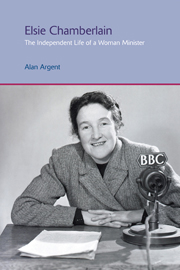Book contents
- Frontmatter
- Dedication
- Contents
- List of Illustrations
- Acknowledgements
- 1 Introduction and Early Life
- 2 The Call to the Ministry
- 3 Elsie Begins Her Ministry, 1939
- 4 The Return to London, 1941
- 5 Flying into the Storms: Chaplain in the Royal Air Force, 1945
- 6 A Season of Clear Shining: Married Life
- 7 Vineyard Congregational Church, Richmond-upon-Thames
- 8 Later Years at Vineyard
- 9 International Meetings and the CUEW Chair
- 10 Elsie at the BBC
- 11 After the BBC: The City Temple
- 12 The Sky Turns Black: Another Crisis
- 13 Sometimes a Light Surprises: The Congregational Federation
- 14 Hutton Free Church, 1971
- 15 A Local Thunderstorm: The Kentish Town Situation
- 16 Presidential Duties and Travelling, 1973–1980
- 17 Going West, 1980
- 18 Ministry in Nottingham, 1984–1991
- 19 Epilogue
- Bibliography
- Index
14 - Hutton Free Church, 1971
- Frontmatter
- Dedication
- Contents
- List of Illustrations
- Acknowledgements
- 1 Introduction and Early Life
- 2 The Call to the Ministry
- 3 Elsie Begins Her Ministry, 1939
- 4 The Return to London, 1941
- 5 Flying into the Storms: Chaplain in the Royal Air Force, 1945
- 6 A Season of Clear Shining: Married Life
- 7 Vineyard Congregational Church, Richmond-upon-Thames
- 8 Later Years at Vineyard
- 9 International Meetings and the CUEW Chair
- 10 Elsie at the BBC
- 11 After the BBC: The City Temple
- 12 The Sky Turns Black: Another Crisis
- 13 Sometimes a Light Surprises: The Congregational Federation
- 14 Hutton Free Church, 1971
- 15 A Local Thunderstorm: The Kentish Town Situation
- 16 Presidential Duties and Travelling, 1973–1980
- 17 Going West, 1980
- 18 Ministry in Nottingham, 1984–1991
- 19 Epilogue
- Bibliography
- Index
Summary
In 1970, having resigned from The City Temple, after rejecting the proposed United Reformed Church, and living in the rectory at Greensted, near Ongar, in Essex, where her husband was the incumbent, Elsie was seeking a pastorate. In 1971, she found one at Hutton, near Brentwood, in London's outer suburban green belt, nearer her home than her previous post. In wartime Liverpool she had learned to be a minister, at Friern Barnet she had stamped her own character, authority and interests on her church, in a time of rebuilding the community, and at middle class Richmond-upon-Thames she had successfully combined the role of pastor, Anglican parson's wife and BBC broadcaster, while working in partnership with a colleague in the ministry. In addition, in the years after the Second World War, she had overcome the objections to her serving as a woman chaplain in the RAF. At The City Temple she had experienced the distinctive demands of a unique City centre church and congregation, while working with a number of part-time and full-time junior and senior colleagues.
Therefore by the early 1970s, Elsie Chamberlain had served in a variety of settings and locations – inner city Liverpool, north London, the armed forces, south west London, religious broadcasting and, most unusual of all, the City of London. She had gained a national reputation, well beyond the confines of Congregationalism by working for the BBC. Indeed she was that most unusual of beings, a mid-twentieth century celebrity whose fame rested entirely on her presentation of the Christian faith.
- Type
- Chapter
- Information
- Elsie ChamberlainThe Independent Life of a Woman Minister, pp. 163 - 184Publisher: Acumen PublishingPrint publication year: 2012

